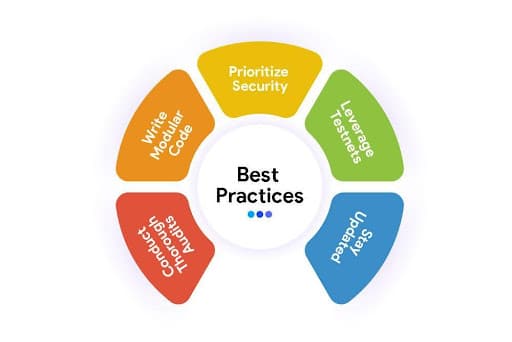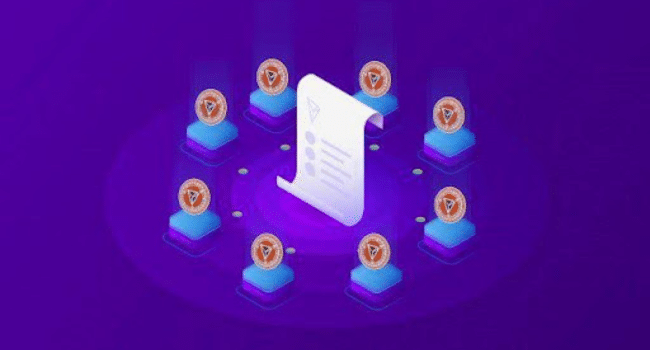Table of Contents
Blockchain technology has changed the way we understand finance, applications, and digital interactions. Smart contracts function as autonomous programs on blockchain networks, removing the need for middlemen. Among the platforms driving smart contract innovation, Tron has become one of the fastest-growing ecosystems. Its high transaction speed, low costs, and friendly environment for developers make Tron a popular choice for businesses and entrepreneurs.
This beginner’s guide explores the essentials of Tron smart contract development. It covers benefits, processes, applications, best practices, industry use cases, and the future of this technology.
The Basics of Tron Smart Contract Development
Tron is a decentralized blockchain network created to support high-performance decentralized applications (dApps).Developers can build smart contracts in a robust environment supported by Solidity, the widely used language behind Ethereum. This compatibility allows developers to easily migrate or adjust existing Ethereum applications to Tron with minimal changes.
Smart contracts on Tron run on the Tron Virtual Machine (TVM), designed to be lightweight, efficient, and scalable. The TVM ensures quick execution of contracts at a significantly lower cost compared to other major blockchains. This advantage makes Tron attractive for projects that need high throughput and frequent transactions, such as gaming, DeFi, and NFT marketplaces.
Why Choose Tron for Smart Contract Development?
Tron’s popularity in blockchain development comes from several clear advantages:
1. High Transaction Speed – Tron’s network can process thousands of transactions per second, ensuring smooth performance for dApps.
2. Low Fees – Unlike Ethereum, where gas fees can fluctuate during congestion, Tron provides very low transaction costs, making it affordable for developers and users.
3. Ethereum Compatibility – Since Tron supports Solidity, developers with Ethereum experience can easily transition to Tron development.
4. Scalability – The network is built for mass adoption, offering scalability that accommodates millions of users without sacrificing performance.
5. Active Ecosystem – Tron has a growing ecosystem, including DeFi platforms, NFT projects, decentralized exchanges, and enterprise solutions, making it an appealing environment for collaboration.
These benefits establish Tron smart contracts development as one of the most cost-effective and user-friendly platforms for deploying smart contracts.
How Tron Smart Contract Development Company Works
Developing smart contracts on Tron involves several steps. While the technical aspects can be complicated, the general process includes:
1. Define the Requirements
Clearly state the purpose of the smart contract, whether it’s for a token, a DeFi protocol, a supply chain application, or another use case.
2. Set Up the Development Environment
Install the required tools, like TronBox (similar to Truffle for Ethereum), TronStudio, or IDEs that support Solidity. Developers should also connect to the Tron Virtual Machine for testing and deployment.
3. Write the Smart Contract
Using Solidity, developers code the contract logic, detailing how transactions, permissions, and interactions will work.
4. Test on the Shasta Testnet
Before deploying to the mainnet, contracts are tested on Tron’s testnet to find bugs and confirm functionality.
5. Deploy on the Tron Mainnet
After testing, the contract is launched on the main network, becoming immutable and publicly accessible.
6. Integrate with dApps
Smart contracts are then linked to decentralized applications, allowing users to interact smoothly.
Practical Applications of Tron Smart Contracts Development
The applications of Tron’s smart contracts span multiple sectors and business domains :
- Decentralized Finance (DeFi): Lending, borrowing, staking, and yield farming protocols thrive on Tron due to low fees and high transaction speed.
- NFTs and Gaming: Smart contracts drive NFT marketplaces and blockchain-based games, ensuring verifiable ownership and transparent in-game economies.
- Token Development: Businesses can create TRC-20 or TRC-721 tokens for utility, governance, or fundraising.
- Supply Chain Management: Smart contracts automate record-keeping and guarantee transparency in logistics and trade.
- Healthcare: Patient records and data sharing can be secured through smart contract systems.
These applications showcase Tron’s versatility as a blockchain solution provider.
Effective Best Practices for Tron Smart Contract Development
To promote security, efficiency, and reliability, developers should observe best practices when working with Tron smart contracts:
- Conduct Thorough Audits: Regular code reviews and audits help avoid vulnerabilities and exploits.
- Write Modular Code: Dividing contracts into smaller components makes them easier to test, upgrade, and maintain.
- Prioritize Security: Employ secure coding methods to prevent common smart contract risks, such as reentrancy or overflow attacks.
- Leverage Testnets: Always ensure comprehensive testing on the Shasta testnet before launching on the mainnet.
- Stay Updated: Keep up with updates to the Tron protocol and Solidity language to ensure compatibility and performance.

Ideal Solutions for Tron Smart Contract Development Services
For businesses and entrepreneurs lacking in-house expertise, collaborating with a blockchain development company that specializes in Tron is a smart choice. Professional teams offer end-to-end support, including:
- Consulting and requirements gathering.
- Custom smart contract design.
- Development, testing, and auditing.
- Integration with dApps and front-end interfaces.
- Ongoing maintenance and upgrades.
Such solutions minimize risk, save time, and ensure a secure launch.
Industries Associated with Tron Smart Contracts
Tron’s expanding ecosystem is gaining traction across numerous sectors:
- Finance and Banking: Decentralized lending, payments, and remittances.
- Entertainment and Media: Content sharing platforms with clear royalty distribution.
- Gaming and Esports: Blockchain-driven economies with in-game assets.
- Healthcare: Secure, verifiable data exchange for medical institutions.
- Supply Chain and Logistics: Transparent systems for tracking the goods globally.
These industries benefit from Tron’s low costs, fast processing, and scalable infrastructure.
The Future of Tron Smart Contract Development
The outlook for Tron-based smart contracts is bright as blockchain adoption increases. With scalability and affordability as its strengths, Tron is well-positioned to draw in both startups and large enterprises. Trends such as Web3 applications, decentralized identity, and cross-chain interoperability are likely to boost Tron’s ecosystem further.
As regulations become clearer, Tron could emerge as a mainstream option for industries looking for cost-effective blockchain solutions. Additionally, AI-powered analytics and automated auditing tools may enhance contract performance and security, making Tron smart contract development services even sturdier in the years to come.
Impact of Tron Smart Contract Use
The widespread use of smart contracts on Tron could reshape how businesses and individuals engage with technology:
- Increased Transparency: All transactions and contract logic are accessible on the blockchain.
- Reduced Costs: With automation, the need for intermediaries disappears, leading to lower operating costs.
- Global Accessibility: Anyone with internet access can engage with Tron-based applications.
- Enhanced Security: Immutable code guarantees fairness and decreases fraud.
- Faster Innovation: Open-source development speeds up new ideas and solutions.
The impact is evident—Tron smart contracts are transforming blockchain ecosystems and driving innovation across industries.
Future Prospects of Tron Smart Contract Development
Tron has established itself as a powerful platform for smart contract development, providing high scalability, low transaction fees, and a developer-friendly environment. From DeFi and NFTs to supply chain management and healthcare, Tron’s possibilities extend across multiple sectors.
By grasping the benefits, processes, and best practices of smart contract development, businesses and developers can seize new opportunities in a decentralized future. As adoption escalates, Tron will likely play an even more crucial role in shaping the next wave of blockchain-powered innovation.
